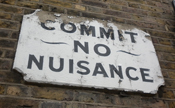Training should be available to the public in how to address anti-social behaviour and deal with aggression and conflict, according to a report published by the RSA, titled First aid approaches to managing anti-social behaviour. Released one year on from the August 2011 riots, what the author terms a radical new approach to tackling anti-social behaviour is required if the problem is to be tackled.
The report argues that with cuts to police budgets and limits to what authorities can achieve on their own, building people’s own capacity to manage anti-social behaviour (ASB) might be more fruitful way forward. The report notes that besides the growth in the security industry, among security guards and door staff, many other workers get some training in handling conflict – publicans and shopkeepers, front-line NHS staff, and teachers. But how those people draw on those skills outside the workplace, we don’t know. As the report puts it, there is a limit to what the police can do to tackle ASB, and ASB remains a stubborn Problem. After a long period of rising spending on the police year on year, ‘the police and other community safety services are facing a tight spending squeeze – spending on the police is due to decline by about a fifth over the course of this parliament. This makes the need to strengthen the public’s role in maintaining social order especially urgent’.
The report concludes there has been a lack of strategic thinking about this problem and that the new (to be elected in November elections) police and crime commissioners should champion the training of ordinary ‘lay people’ to provide their communities with relevant mediation or conflict resolution skills.
It suggests replicating ‘the Woolwich model’ – in which first aid training spread across the globe after courses were first established in Woolwich in 1878. The report shows that the riots in the summer of 2011 – including in Woolwich – laid bare both the risks and strengths of self-organised citizen defence.
The report concludes that while public concern for low-level disorder remains high, citizens have little or no confidence to intervene. Pursuing this agenda as part of inclusive strategies aimed at building long term civic capacity would also go some way towards healing our anxious communities, the report says.
The report begins by pointing to the widespread agreement that the Metropolitan Police took too long to get enough officers onto the streets in August 2011 when riots spread across London: “… it was only with a massively expanded police presence on the fourth night of the riots, that the police finally got a grip on the turmoil. But by the fourth night it was not only the police who were beginning to make their presence felt on the streets. So were civilians. Many of these came together in groups. In Enfield, north London, and Eltham in South London groups of residents patrolled the town centres. Shopkeepers in Hackney closed their shops for the night, and took up position in Kingsland High Street. Residents and shopkeepers chased off would-be looters in East Ham and Bethnal Green. Several hundred Sikh men gathered to defend their temple in Southall.”
Author Ben Rogers said: “With the real prospect of traditional police patrolling being scaled back, now is surely the time to focus seriously on agreeing the core skills that active citizens need – individually or collectively – if they’re to step up to the mark. The coalition government has signalled its determination to encourage and support citizens to ‘have a go’ and intervene to stop criminal behaviour. But to do this – citizens need training – and the government needs a strategy if these emerging ideas are to be supported and developed.” The report concludes that:
Police officers or ‘lay trainers’ should provide training to local people about how to deal low level anti-social behaviour.
Training should also be given to frontline public servants including park keepers, public transport workers, street cleaners, parking enforcement officers, caretakers, teachers and other school staff, social workers, community and youth workers and neighbourhood managers.
People who are not in public service but present and potentially influential within their communities could also benefit from training including shop-keepers, publicans and postal workers.
Training should include a) self-protection and restraint – what physical steps to take to minimise the risk to oneself b) how to ‘read’ a situation, to appraise when it’s appropriate to walk on by, when it’s safe to intervene, or when to call the police c) skills in conflict resolution and mediation – how to defuse and argument, forge an agreement and where appropriate elicit an apology.
Published at the same time, another RSA report by the same author (Ben Rogers) argues that managing risks and addressing perceptions of risk is important if Big Society Policies are to succeed. Risk and the Big Society concludes that fears about the risks involved in devolving power and rolling back bureaucracy is putting the break on reform and frustrating attempts to develop a more participatory, socially productive ways of doing things.
The report focusses on a particular sub-set of risks – what Ben Rogers calls ‘risks that keep managers awake at night’ – and concentrates on what new, ‘bottom up’ ways might be developed for managing them (as opposed to ‘top down’ regulation and legislation).
He offers no silver bullet, but instead makes the case for further experiment at a number of different levels, ranging from adopting design of public spaces in order to encourage greater mutual responsibility, to greater training or mentoring for volunteers in charge of services, to greater use of social media to enable reporting of concerns or assessment of quality.
You can read Ben Rogers’ 24-page report on ASB online at the RSA website.
Rogers also wrote a pamphlet for the RSA (Royal Society for the encouragement of Arts, Manufactures and Commerce) in 2010: The Woolwich Model: Can Citizens Tackle Anti-Social Behaviour?









